Innovation must reach the market to make a bold impact
At the recent ChangeNOW Summit in Paris, collaboration, public-private funding opportunities and speed were identified as the key factors in winning the race to net zero.
During the event in Paris, EIT Manufacturing played an important role in driving discussions on circular economy and industrial decarbonisation. Blanca Chocarro, EIT Community Senior Project Manager, moderated a session with three panel discussions on sustainable industrialisation on the collective stage. Jérémie Dalibot, Business Creation Manager at EIT Manufacturing West, hosted a workshop entitled “Startups reshaping industry: solutions for the circular economy”.
Jérémie Dalibot was able to build on his experience from the BoostUp! France startup competition, which he presented on behalf of EIT Manufacturing in December. This event focused on the circular economy and drew Change Now’s attention to the EIT Manufacturing ecosystem. In particular, they recruited one of the startups to repeat their pitch on the Garden Stage and asked Jérémie Dalibot to join the jury.
Startups pave the way to circular economy
“It is truly inspiring to see the passion and creativity of these entrepreneurs involved in the transition to a circular economy,” he admitted after listening to the ten candidates who came from countries as diverse as Austria, Cyprus, Germany, France, Norway, Spain or Switzerland. “From upcycling waste to reducing resource consumption and repairing appliances, these solutions are contributing to a more sustainable future.”
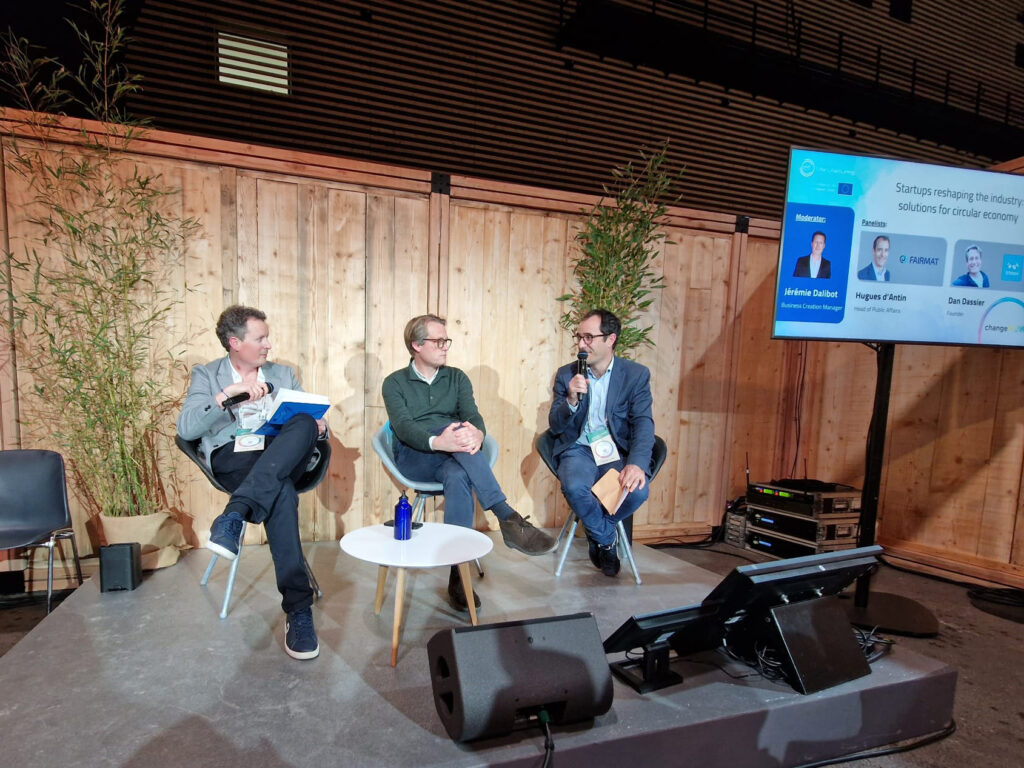
From left to right: Jérémie Dalibot, Business Creation Manager at EIT Manufacturing West, invites Dan Dassier, founder of Trinov, and Hugues d’Antin, head of public affairs at Fairmat, to join him during a workshop on circular economy.
An audience of around 50 people welcomed Dan Dassier, founder of Trinov, and Hugues d’Antin, head of public affairs at Fairmat, to the workshop stage. The former BoostUp! France winners offer circular solutions: Trinov deals with waste management using IoT, AI and real-time data, Fairmat supports the reuse of carbon fibre. Jérémie Dalibot invited them to reflect on the importance of partnerships to co-develop systems and redesign products and processes for more circular production. Both agreed that companies are making progress by taking positive decisions regarding their supply chain. However, they felt that SMEs in particular still lack the resources or even the mindset.
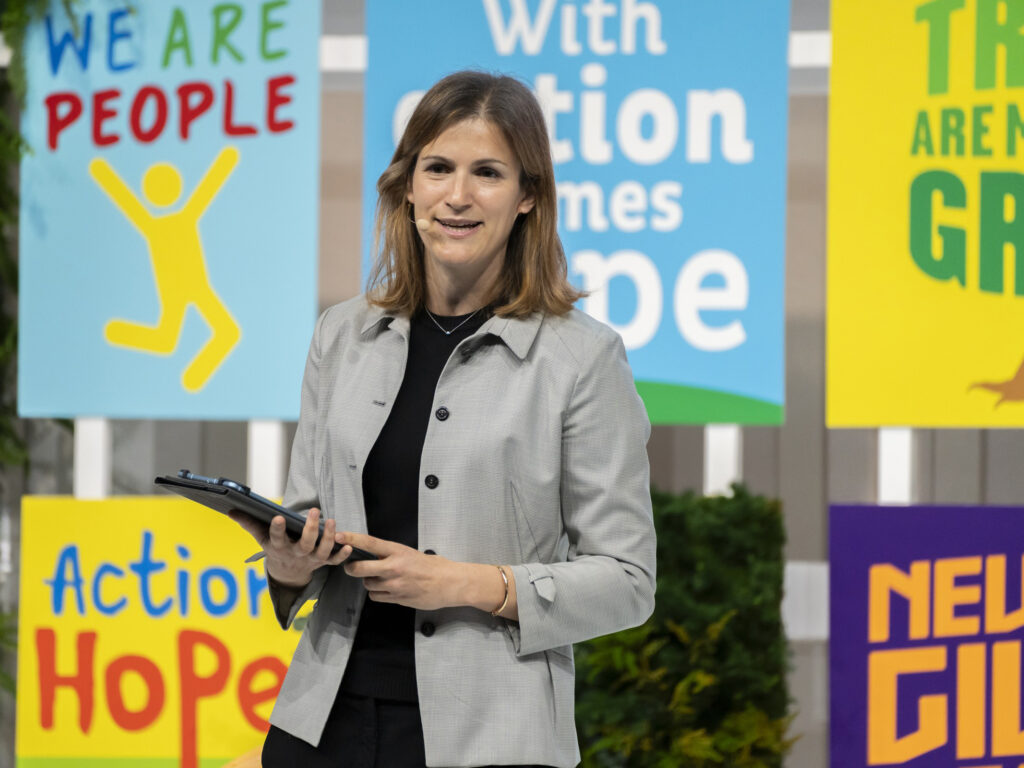
Blanca Chocarro, EIT Community Senior Manager at EIT Manufacturing West, takes the Collective Stage to host the session on Sustainable Industrialisation.
During the Sustainable Industrialisation session, Blanca Chocarro was joined by a number of high-level speakers from government and C-level executives from industry to discuss the drastic change required to achieve zero greenhouse gas emissions. She wanted to discuss regulation, financial instruments, innovation, technology, leadership and skills, as ambitious goals can only be achieved by working together at all levels.
Europe should cooperate more and be less humble
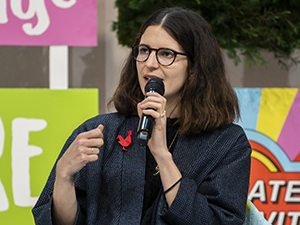
“Even if startups develop the best innovations on the planet, they won’t have a real impact if they don’t sell to the companies that pollute the most,” said Clara Chappaz, director of Mission French Tech, during the first of three panels. This is why she and her co-panellist Sammy Fry, head of climate at Tech Nation, are working to promote ecosystems that bring together governments, entrepreneurs, investors, talent, non-profit organisations and companies that are able to support startups beyond their financial needs.
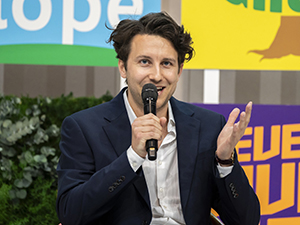
Blanca Chocarro could conclude the first part of the dynamic discussion by encouraging Europe to step up its collaborative efforts to become an innovation leader in the net zero transition, leaving behind false modesty. Sammy Fry noted a positive exponential shift in climate tech, with the number of specialised startups increasing from 10.000 to more than 60.000 globally in the last 10 years. However, he sees a critical funding gap for high-impact companies between R&D and commercialisation: “To bridge this gap, a more supportive public-private funding landscape is essential.”
The green transition has to involve all of us
Sylvain Waserman, CEO of ADEME, the French Agency for Ecological Transition, echoed this sentiment during the connecting panel. He identified the balance between public and private funding as one of the main challenges to decarbonising industry, alongside time pressures. Joana Freitas, executive member of the board of EDP, a major electricity supplier, agreed, stressing that “infrastructure built over 200 years has to be changed in just 30 years”. She warned that no one should be left behind in this transition. When her company converted a coal plant to produce renewable energy such as hydrogen, it managed to redeploy 100% of the workers affected, in part by retraining them.
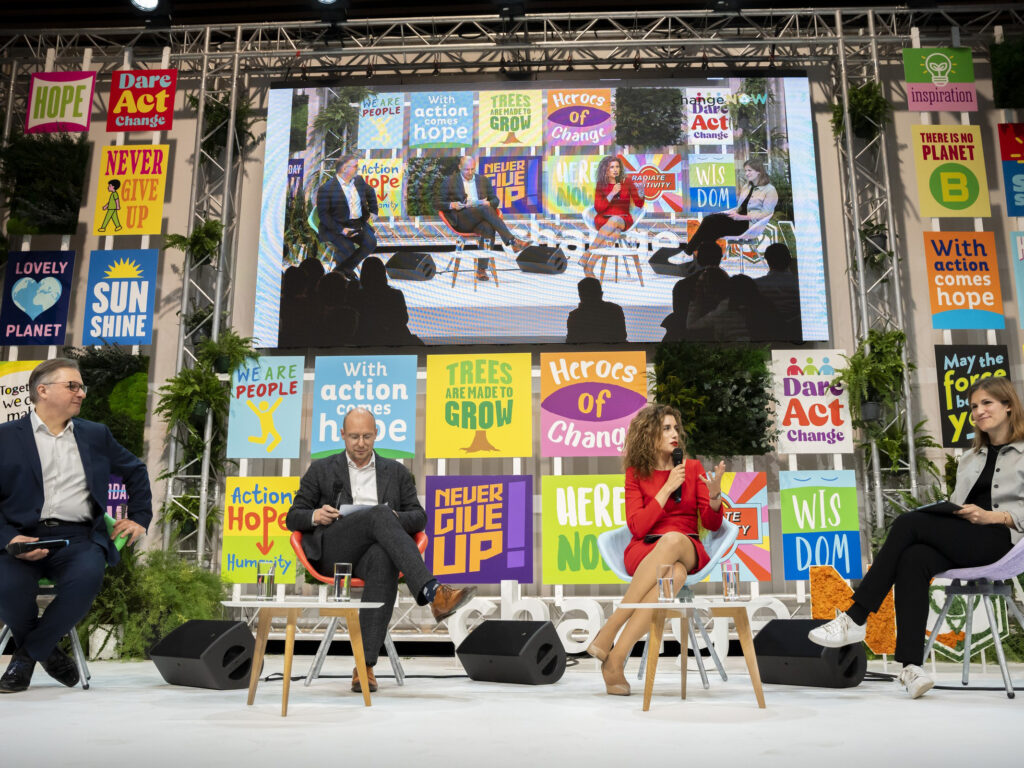
From left to right: Sylvain Waserman, CEO of ADEME, the French Agency for Ecological Transition, Johannes Trüby, head of energy and climate economics at Deloitte France, Joana Freitas, executive member of the board of EDP, and Blanca Chocarro talked about time pressure.
The third panellist, Johannes Trüby, head of energy and climate economics at Deloitte France, offered some good news: by focusing efforts on a few concrete issues, it will be possible to reduce a large proportion of global emissions. “Steel, cement and chemicals account for 60% of global industrial emissions,” he said. In addition, good policies in the top ten emitting countries, which account for 75% of emissions, could be very effective.
Decarbonisation needs to be done fast
For the final panel of the session, Blanca Chocarro welcomed Bruno Bonnell, Secretary General for Investment, who leads the France 2030 investment plan, and Benoit Bazin, CEO of Saint-Gobain, to contrast the government’s approach and the private sector’s view of the green transition to be implemented. While Bruno Bonnell highlighted the investments already made, Benoit Bazin emphasised the long-term mindset required for this type of investment. He went on to call on the government for “a global carbon price, visibility and stability of the framework, and massive investment in green energy”.
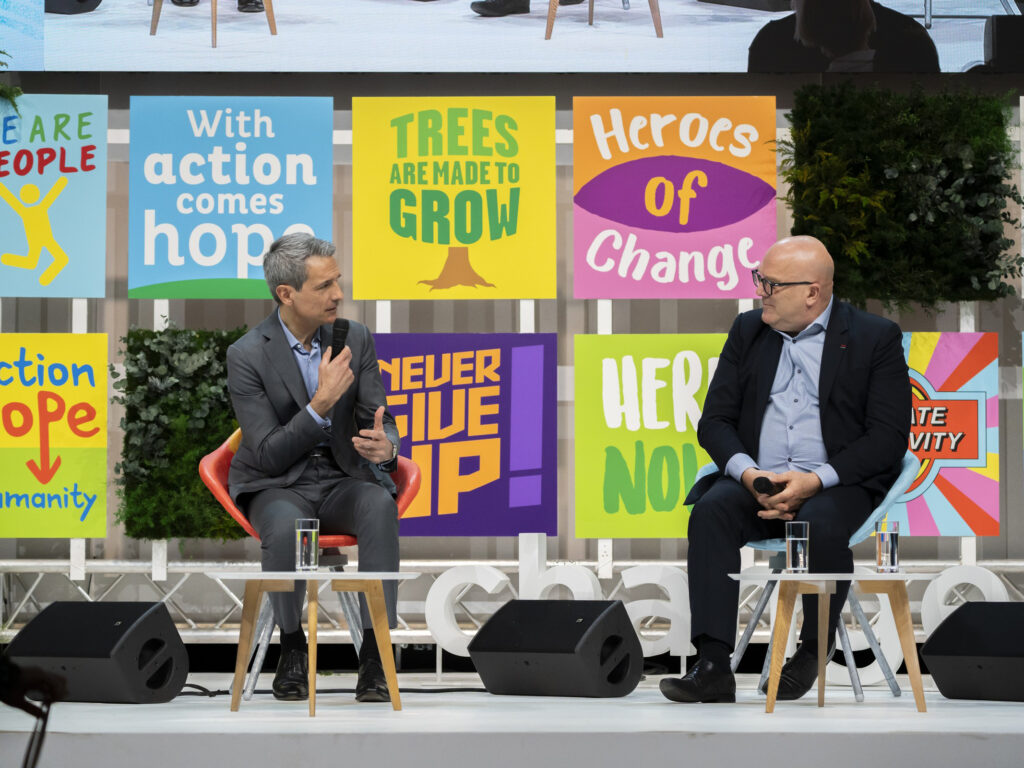
Benoit Bazin, CEO of Saint-Gobain, (left) and Bruno Bonnell, Secretary General for Investment, who leads the France 2030 investment plan (right), completed the session.
The packed audience of nearly 500 cheered when Blanca Chocarro asked the panel to reflect on the timeline for achieving net-zero goals, and Bruno Bonnell assured her: “We are on track.” Benoit Bazin shared his co-panelist’s optimistic message but reminded the audience not to “underestimate the need for speed of execution”. This wide-ranging discussion among high-profile speakers provided a fair balance of opportunities for improvement and promising practices that should be followed in a spirit of vigilance, but also of optimism, in view of current challenges.
Have a look at the whole conversation!
During the session on sustainable industrialisation, Blanca Chocarro hosted three panel discussions with high potential speakers who reflected on challenges, opportunities and shared some positive thoughts. See the recordings for more details:
ChangeNOW
ChangeNOW is a social enterprise launched in 2017 to accelerate the environmental and social transition. On 25, 26 and 27 March 2024, they celebrated their annual summit at the Grand Palais Ephémère in Paris, which they describe as “the biggest event of solutions for the planet”.
BoostUp! France
BoostUp! France is an EIT Manufacturing initiative that aims to identify and support French startups, helping them to internationalise and expand their business across Europe. In December 2023, the startup competition called for ideas on the circular economy. Fairmat, Trinov and Neolitik were the winners at Station F in Paris.

